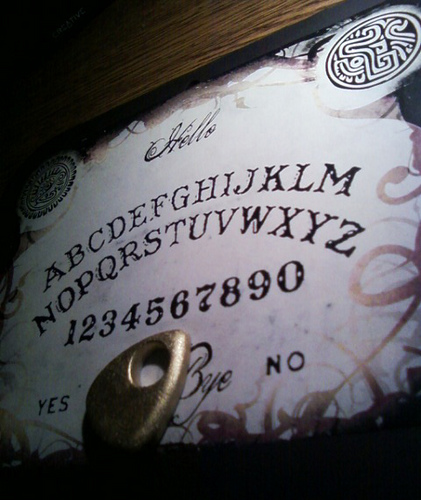Satanic, subconscious, or something else?
This month's Smithsonian Magazine, in tune with October's spooky theme, has a long and fascinating article about the history of the Ouija board. Surprisingly, for such an iconic item, the history of the board's development was difficult for a researcher to track down.
Although the popularity of the modern Ouija board dates to the American obsession with spiritualism in the 1800s, the concept is much older and cosmopolitan. The basic idea is that you give over control of your hands to the spirits, allowing them to guide you into communicating their answers to your questions. The same concept underlies automatic writing and many other forms of scrying, both ancient and modern.
The contemporary psychological answer to the functionality of the Ouija board is that it allows the players to tap into their subconscious. Except in cases of deliberate fraud, most Ouija board users are unaware of the fact that they are deliberately guiding the planchette around the board. Their subconscious guides the little wooden piece around to all the letters, representing a more direct expression of the subconscious than we usually allow ourselves. (So Freudian!)
Anyone seeking to debunk a Ouija board session can do so easily, by blindfolding all of the participants. However, this doesn't dissuade many people from believing that the so-called board game is actually a tool of the devil. Tales abound of sinister Ouija board sessions, many of which take place at children's sleepover parties.
It's undeniably true that using an Ouija board can be an unsettling experience. Consider this: the Ouija board named itself. When the Kennard Novelty Company created the board, the designer was stumped as to what to call it. His sister-in-law, whom he described as being a "strong medium," sat down with the Ouija board and asked what they should call it. The board responded "Ouija," and when they asked what that meant, it simply answered "Good luck."
The Ouija board has been popular for over 120 years, but it probably hit its high point in the early 1970s after the blockbuster hit The Exorcist. The movie's demonic events are all kicked off by an ill-fated session with a Ouija board, when little 12 year-old Regan, while playing with the board alone one night, is possessed by a demon.
This seems to be the moment when the Ouija board's reputation as being the tool of demonic influences was cemented in the cultural consciousness. Ouija boards have been denounced by religious authorities for years, and have even been burned at religious ceremonies (along with copies of Harry Potter).
